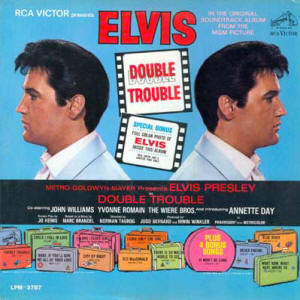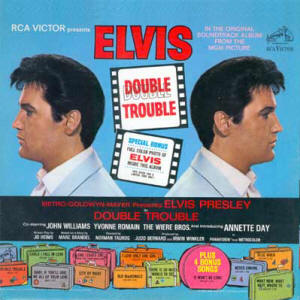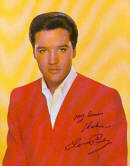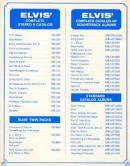

The gospel album "How Great Thou Art" was
followed in June 1967 by the soundtrack of
"Double Trouble", the king's forthcoming
motion
picture. Starting on June 20th Billboard
listed the record on the "Top LPs Chart" for 20
weeks, but with sales of 200,000 units it didn't
climb past number 47. Worldwide "Double Trouble"
barely moved 1.6 million copies (according to
the RIAA that's 240 million paid streams of the
complete album, respectively 2.4 billion
individual tracks) and therefore became the
king's worst selling album to date.
In 2016 the complete Presley catalogue was
restored and remastered by Vic Anesini for a
boxed set of 60 compact discs called "The Album
Collection". Sony Music Entertainment provides
the streaming platforms with the same versions
of the individual albums (some of them offering
bonus tracks), albeit in 24 bit/90 khz flac.
That means, if the platform of your choice
supports high resolution audio, you can enjoy
the tracks in the same quality Sony used to scan
and master them. On Spotify, which has a market
share of approximately 30% and is the only
platform that publishes streaming figures,
"Double Trouble" accumulates less than 4 million
streams and therefore belongs to the ten least
popular Presley albums. In other words: It
shares the fate of Presley's other mid-sixties
soundtracks.
The cover design was meant to match the title
of the album, RCA Victor used a promo shot for
the accordant movie. To raise the sales appeal
the first edition also included a special
collector's card, which featured a four years
old picture made in conjunktion with the motion
picture "Viva Las Vegas".


Because the soundtrack was rather short RCA
Victor filled the album with several bonus
songs. One of them had been cut from "Double
Trouble", the others were left-overs from Mai
1963. Nevertheless the album was a short one, it
runs for just 22:36 minutes.
The sessions for "Double Trouble" began on
June 28, 1966 at Radio Recorders, but were moved
the next day to MGM's own soundstage. The reason
was the dissatisfation of the studio bosses with
Elvis' lack of punctuality. They hoped to gain
more control of the sessions and also were happy
to save the rent for the studio. Unfortunately
the vast sound stage was not appropriate for
making records. In the end there was too much
hiss on the tape, besides that Elvis' voice once
again was brought too much to the fore and
everything sounded somewhat muddy.
The sessions were produced by Jeffrey
Alexander, the sound engineers were Dave
Weichman (Radio Recorders), Aaron Rochin (MGM)
and Lyle Burbridge (MGM). Elvis' band consisted
of Scotty Moore (guitar), D.J. Fontana (drums),
Hilmer J. Timbrell (guitar), Charlie McCoy
(guitar and harmonica), Bob Moore (bass), Murrey
Harman (drums), Floyd Cramer (piano), Pete Drake
(steel guitar), Homer Randolph (saxophone) und
Richard Noel (trombone). The harmony vocals were
provided by The Jordanaires (Gordon Stoker, Hoyt
Hawkins, Neal Matthews and Ray Walker).
"City By Night" and "Baby If You Give Me All
Your Love" were overdubbed on July 14th at the
MGM Soundstage. The session was produced by
Jeffrey Alexander and engineered by Aaron Rochin
and Lyle Burbridge. The musicians were Michael
Deasy (guitar), Jerry Scheff (bass), Toxey
French (drums), Michael Henderson (saxophone)
und Wyan Parker (saxophone).
In 2004 Follow That Dream Records released a
collector's edition of "Double Trouble", which
also included outtakes. To read a review please
tap
HERE.
Double TroubleThe singer is
in love with two women and therefore he's in
double trouble. The song was written by Doc
Pomus and Mort Shuman, who had delivered some
excellent popsongs for Elvis in the early 1960s.
The composers still wrote in the same style, so
by 1967 a song like "Double Trouble" sounded
somewhat old fashioned. However, it's a nice
enough song and certainly not the worst of
Elvis' movie tunes. The recording was made on
June 29, 1966 at the MGM Soundstage, take 4 was
chosen for post production and release. Because
there was no proper finale the band and The
Jordanaires recorded a separate workpart-take of
the ending, which was spliced with take 4 to
create a proper master.
Baby If You Give Me All Your Love
Here we have another one of these mediocre movie
tunes. Elvis recorded it on the same day as
"Double Trouble" and needed five takes to do so.
On July 14th a guitar was added. The author of
the song is Joy Byers.
Could I Fall In Love
Elvis recorded the song on June 28, 1966 at
Radio Recorders and added his harmony vocal two
days later at the MGM Soundstage. And this is
the problem, because the additional track
included a lot of hiss and lowered the quality
of the recording considerably. The ballad itself
is a solid effort by Randy Starr.
Long Legged Girl (With The Short Dress
On)
The singer tells us about the hardships of his
search for the girl with the long legs and the
short frock. The rocking melody and the edgy
electric guitar were supposed to sound modern,
but still "Long Legged Girl (With The Short
Dress On)" never leaves the level of a mediocre
movie tune. To promote the soundtrack RCA Victor
released the track in advance on a single,
CAMDEN re-used it on the budget albums "Almost
In Love" (1970) and "Elvis Sings Hits From His
Movies - Volume 1" (1972). Elvis recorded the
song on June 29, 1966 at the MGM Soundstage. The
fifth take became the master.
City By Night
Because Elvis arrived late at Radio Recorders on
June 28th, the band produced a rhythm track of
"City By Night". The jazzy song didn't seem to
challenge anyone, because the third attempt was
already considered a master take. Two days
later, this time at the MGM Soundstage, Elvis
added his vocals. He recorded ten takes, finally
choosing number 5 as master take. For whatever
reason take 10 was also copied to the master
reel and labeled "alternate master". The song
was written by Bill Giant, Bernie Baum and
Florence Kaye. "City By Night" is definitely one
of the better movie tunes.
Old Mac Donald
The children's song is based on a title from the
opera "The Kingdom Of Birds", written in 1720.
Later versions were "The Farm Yard, Or The Merry
Green Fields" (1908), Ohio (Old Macdougal Had A
Farm) (1917) and "Old Missouri" (1922). The
oldest known recording was made in 1925 by The
Sam Patterson Trio. Here it was already named
"Old Mac Donald Had A Farm". Later the song was
also recorded by Frank Sinatra, Ella Fitzgerald
or Elvis Presley. He did it on June 29, 1966 at
the MGM Soundstage. The master was a combination
of take 3 (rhythm track), take 7 (vocal track)
and a vocal repair recorded on June 30th. The
tune was re-written by Randy Starr, which
legally created a new song that could be
published on its own. CAMDEN released "Old Mac
Donald" in 1972 on the budget album "Elvis Sings
Hits From His Movies - Volume 1".
I Love Only One GirlHere we
have another adaption of an old song. "Aupres De
Ma Bonde" was sung by the French infantry in the
days of Louis XIV and originally is a children's
song. This time Sid Tepper and Roy C. Bennett
took care of creating a legally new song. The
result was called "I Love Only One Girl" and
recorded by Elvis on June 29th within just two
takes. The singer announces to love only one
girl - in every town. Amongst others our spare
time Casanova has a girlfriend in Germany. She
is named Brunhilda and lives in Frankfurt on the
Rhine! In fact the city is located on the Main,
but who cares about geography in a Presley
movie? This track was also re-released by
CAMDEN, this time on "Burning Love And Hits From
His Movies" (1972).
There's So Much World To See
On June 28, 1966 Elvis recorded ten takes of
"There's So Much World To See" and selected the
final attempt for release. After doing so he
recorded another version, that was supposed to
be used in the movie and was overdubbed with
strings on November 17th. In the end RCA Victor
didn't use the record version, but the same
track as MGM. "There's So Much World To See" was
written by Sid Wayne and Ben Weisman. The singer
tells his loved one, that he cannot settle down
because he hasn't seen enough of the world yet.
It's not a great song, but nice enough.
It Won't Be Long
(bonus song)
This song was penned by the same team and
recorded by Elvis on June 29, 1966 at the MGM
Soundstage. Five takes were put on tape, finally
the king choose the third one for release.
Originally "It Won't Be Long" was supposed to be
used in "Double Trouble". When MGM decided
against it, RCA Victor simply labeled it as
"bonus song".
Never Ending
(bonus song)
Many fans already knew the song from the b-side
of the single "Such A Night", released by RCA
Victor in 1964. Elvis had recorded "Never
Ending" on May 26, 1963 at RCA Studio B in
Nashville/Tennessee within 3 takes. The nice,
uptempo popsong was written by Buddy Kaye and
Phil Springer.
Blue River
(bonus song)
This one had also been issued on the b-side of a
single, this time "Tell Me Why" in late 1965.
The track was penned by Paul Evans and Fred
Tobias, Elvis had recorded it on May 27, 1963 at
RCA Studio B in Nashville/Tennessee. The master
was created by lengthening the second take.
What Now, What Next, Where To
(bonus song)
Originally Don Robertson had written the song
for Johnny Cash, but he refused it. So it was
offered to Elvis, who recorded it on May 26,
1963 at RCA Studio B in Nashville/Tennessee
within a single take. I like that popsong very
much, to me it's the highlight of this album. By
1967, however, the sound was already outdated.
CAMDEN re-released "What Now, What Next, Where
To" in 1972 on the budget album "Separate
Ways".
Verdict
The sound is muffled and hissy, Elvis is
way too much upfront in the mix and the
album is quite short. Most of the movie
tunes are mediocre and on some of them the
king sounds downright bored. The bonus
tracks are of much better quality (writing,
performance and technical execution),
but by 1967 the sound was already outdated.

(C) RCA Records
![]()



